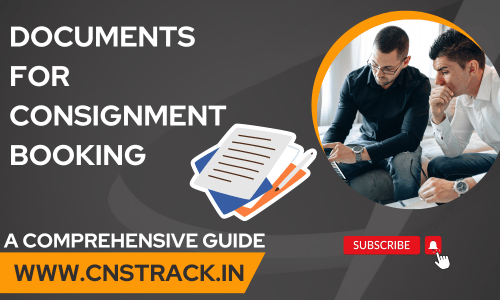Documents for Consignment Booking: Consignment booking is a crucial aspect of logistics and shipping for businesses across various industries.
Whether you’re a manufacturer, distributor, or retailer, ensuring that your goods are transported efficiently and securely is vital for the smooth operation of your supply chain.
However, to initiate the process of consignment booking, you need to have all the essential documents in order. These documents serve as the foundation for a successful shipment, providing critical information to carriers, customs authorities, and other stakeholders involved in the transportation of your goods.
Documents for Consignment Booking
In this comprehensive guide, They will delve into the essential documents required for consignment booking, helping you navigate the intricacies of shipping and logistics with confidence and clarity. From invoices to E-waybill details and packing lists, we’ll cover it all to ensure your consignments reach their destination smoothly and on time.
When it comes to shipping goods, proper documentation is paramount. Having the right documents in place ensures a seamless and hassle-free transportation process. Whether you are a shipper or a logistics provider, understanding the required documents for consignment booking is crucial. In this guide, we will delve into the essential documents that should accompany your consignment to ensure a smooth journey from sender to receiver.
Invoice:
The invoice is one of the fundamental documents required for consignment booking. It serves as a legal document that provides a detailed account of the goods being shipped, including their description, quantity, value, and applicable taxes. The invoice should clearly state the names and addresses of both the sender (consignor) and the recipient (consignee). Accuracy in invoice details is essential to prevent any discrepancies during transportation.
E-Waybill Details:
In many countries, including India, an Electronic Waybill (E-Waybill) is mandatory for the movement of goods. The E-Waybill contains information such as the GSTIN (Goods and Services Tax Identification Number) of both the consignor and consignee, the vehicle number, and details of the goods being transported. It acts as evidence of the consignment’s compliance with tax regulations and is electronically verified by tax authorities during transit.
GR Copy:
The Goods Receipt (GR) copy is a critical document that acknowledges the successful receipt of the consignment by the consignee. It typically includes details such as the date and time of delivery, the condition of the goods upon receipt, and the recipient’s signature. This document serves as proof that the consignment reached its destination and was accepted by the consignee in the stated condition.
Packing List:
A packing list is an itemized document that provides a summary of the contents of the consignment. It includes information about the individual items, such as their names, quantities, dimensions, and weight. The packing list aids in easy identification and verification of the goods during the shipping process. It also assists in customs clearance procedures, as customs officials can use it to verify the consignment’s contents.
Additional Documentation:
Depending on the nature of the goods and the shipping destination, additional documents may be required. These can include certificates of origin, import/export licenses, permits for specific goods (such as hazardous materials), and any other documents mandated by local or international regulations.
Ensuring that all these documents are complete and accurate is crucial for a smooth consignment booking process. Any discrepancies or missing information can lead to delays, penalties, or even the seizure of the goods during transit. Therefore, it is advisable to work closely with your logistics provider or freight forwarder to ensure compliance with all documentation requirements.
In conclusion, proper documentation is the backbone of efficient logistics and supply chain management. When booking a consignment, be diligent in preparing and verifying all the necessary documents. This diligence will not only help in avoiding legal issues but also contribute to a seamless and successful shipping experience for all parties involved.
